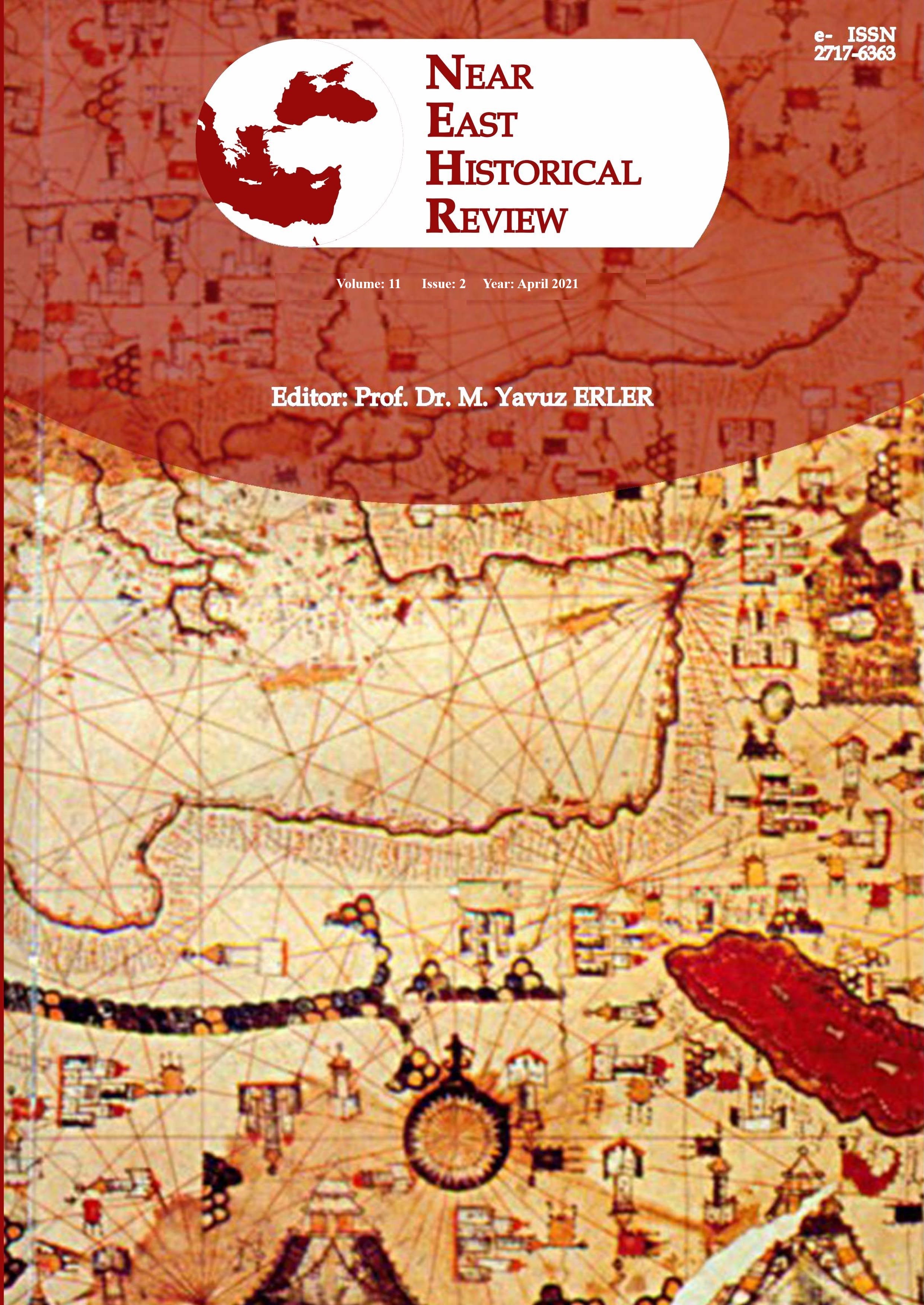Author :
Abstract
Osmanlı diplomasisinde tayinat sistemi, belirli kaideler üzere yabancı elçilerin günlük masraflarının devlet hazinesinden karşılanması ve buna mukabil diğer devletlere gönderilen Osmanlı elçilerinin masraflarının da ev sahibi devlet tarafından karşılanması usulüdür. Bu usul Avrupalı elçiler için 1794’te uygulamanın kaldırılışına dek sürmüştür. Osmanlı Devleti’ne gönderilen Avusturya elçilerinin de masrafları Babıali tarafından karşılanmıştır. 18. yüzyılda bu elçilerin önde gelenleri Leopold Talmann (1703-1713), Ludwig von Talmann (1728-1737), Heinrich Freicherr von Penckler (1740?-1755 ve 1761-1766) ve Peter Freiherr von Herbert-Rathkeal (1779-1788 ve 1792-1802)’dır. Avusturya ile siyasi ilişkilerin tayinatlara nasıl yansıdığı, Babıali’nin her bir elçi için başvurduğu uygulamaları hangi parametrelere göre belirlediği ve bazı durumlarda niçin kaide dışına çıkıldığının soruları bu makale dahilinde incelenmektedir. 18. yüzyılda Avusturya ile yaşanan savaşlar ve diplomatik ilişkiler göz önüne alındığında Babıali’nin tayinatları belirleme konusunda belirli politik gelişmeleri ve kadim uygulamaları hep birlikte değerlendirdiği söylenebilir. Avusturya elçilerinin tayinatları üzerine toplu bir incelemeyi içeren ilk çalışma olarak bu makalenin amacı, Osmanlı kaynakları ışığında Avusturya elçilerine verilen tayinatları, ikili ilişkiler ve uluslararası gelişmeler çerçevesinde bir değerlendirmeye tabi tutarak yeni tespitler sunmaktır.
Keywords
Abstract
In the Ottoman diplomacy, “the tayinat” system is the practice of meeting the daily expenses of foreign envoys/ambassadors from the state treasury and the payment of the expenses of the Ottoman envoys sent to other states by the host state within the framework of certain rules. This system lasted for the European envoys until the abolition of the practice in 1794. The expenses of the Austrian envoys sent to the Ottoman Empire were also covered by the Porte. In the 18th century, the prominent of these envoys were Leopold Talmann (1703-1713), Ludwig von Talmann (1728-1737), Heinrich Freicherr von Penckler (1740? -1755 and 1761-1766) and Peter Freiherr von Herbert-Rathkeal (1779-1788 and 1792-1802). This article examines how the political relations between the Ottomans and the Austrian Habsburgs were reflected in the tayinat. In addition, the questions by which parameters the Porte determines the tayinat practices for each envoy and why it goes beyond the rule in some cases are analyzed within this article. Considering the wars and diplomatic relations with the Habsburg Monarchy in the 18th century, it can be said that the Porte evaluates certain political developments and ancient practices altogether in determining tayinats. The purpose of this article, as the first study that includes a collective research on this subject, is to present new ascertainments by subjecting the tayinats given to the Austrian envoys in the light of Ottoman sources, within the framework of bilateral relations and international developments.
Keywords
- Cevdet, Hariciye (CH) 4/175; 5/218; 8/393, 9/426; 13/617; 15/719; 15/728; 17/844; 20/981; 32/1590; 34/1660; 35/1736; 37/1804; 40/1992; 43/2134; 51/2536; 63/3137; 65/3240; 65/3246; 68/3388; 72/3555; 91/4536; 92/4567; 107/5344; 108/5366; 116/5784; 134/6687; 146/7261, 150/7455; 156/7768; 158/7884; 159/7925; 159/7939; 162/8084; 164/8166; 167/8332; 173/8616; 178/8875; 179/8917; 181/9043, 184/9184; 187/9307; 108/5366.
- von Hammer Purgstall, Joseph, Büyük Osmanlı Tarihi, Cilt: 7-8, Üçdal Neşriyat, İstanbul 1994.
- Itzkowitz, Norman, Mote, Max, Mubadele, An Ottoman-Russian Exchange of Ambassadors, Chicago University Press, Chicago-London, 1970.
- Kuran, Ercüment, Avrupa’da Osmanlı İkamet Elçiliklerinin Kuruluşu ve İlk Elçilerin Siyasi Faaliyetleri, Türk Kültürünü Araştırma Enstitüsü Yayınları, Ankara 1988.
- Matsch, Erwin, Der Auswärtige Dienst von Österreich (-Ungarn) 1720-1920, Hermann Böhlaus Nachf., Wien Köln, Graz 1986.
- Özen Yılmaz, Güzin, Elçiye Zeval Olmaz, 16.-18. Yüzyıllarda Osmanlı’da Yabancı Elçiler, Remzi Kitabevi, İstanbul 2014.
- Savaş, Ali İbrahim, Mustafa Hatti Efendi Viyana Sefaretnamesi, Türk Tarih Kurumu Yayınları, Ankara 1999.
- Schweigger, Salomon, Sultanlar Kentine Yolculuk 1578-1581, (Çev. T. Noyan) Kitap Yayınevi. İstanbul 2004.
- Topaktaş, Hacer, Osmanlı-Lehistan Diplomatik İlişkileri, Franciszek Piotr Potocki’nin İstanbul Elçiliği (1788-1793), Türk Tarih Kurumu Yayınları. Ankara 2014.
- Turan, Namık Sinan, İmparatorluk ve Diplomasi: Osmanlı Diplomasisinin İzinde, İstanbul Bilgi Üniversitesi Yayınları, İstanbul 2014.
- Unat, Faik Reşit, Osmanlı Sefirleri ve Sefaretnameleri, yay. Bekir Sıtkı Baykal, Türk Tarih Kurumu Yayınları, Ankara 1992.
- Werner, Crailsheimli Adam, Padişahın Huzurunda, Elçilik Günlüğü, 1616-1618, (Çev. T. Noyan), Kitap Yayınevi. İstanbul 2011.
- Yalçınkaya, Mehmet Aaladdin, The First Permanent Ottoman Embassy in Europe The Embassy of Yusuf Agah Efendi to London (1793-1797), ISIS, İstanbul 2010.
- Yıldırım, İbrahim, Osmanlı Devleti’nde Elçi Kabulleri, Kitap Yayınevi, İstanbul 2014.
- Yurdusev, A. Nuri (ed), Ottoman Diplomacy Conventional or Unconventional, Palgrave Macmillan, New York 2004.
- Zinkeisen, Johann Wilhelm, Osmanlı İmparatorluğu Tarihi, çev. Nilüfer Epçeli, Cilt: 5-6, Yeditepe Yayınevi, İstanbul 2011.
- Kurtaran, Uğur, “Karlofça Antlaşması’ndan Sonra İstanbul’a Gelen Yabancı Elçı̇lerı̇n Ağırlanması ve Yapılan Harcamalar”, Tarih Araştırmaları Dergisi, Cilt: 37/63, 2018, p. 331-370.
- Kütükoğlu, Mübahat, “XVIII. Yüzyılda Osmanlı Devleti’nde Fevkalâde Elçilerin Ağırlanması”, Türk Kültürü Araştırmaları Dergisi – Ercüment Kuran’a Armağan, Cilt: XXVII/1-2, (1989), s. 199-231.
- Naff, Thomas, “Reform and the Conduct of Ottoman Diplomacy in the Reign of Selim III 1789- 1807”, Journal of the American Oriental Society, Cilt: 83, nr. 3, (1963), s. 295-315.
- Topaktaş, Hacer, “Polonya’nın Türkiye’deki İlk Daimî Elçiliğinin Kurulma Süreci: Tarihsel Dinamikler”, Uluslararası İlişkiler, Cilt: 11/43, 2014, s. 105-125.
- Topaktaş, Hacer, “Osmanlı Diplomasisinde “Tayinat” Sisteminin Uygulanışı ve Kaldırılışı (1794) Üzerine Bazı Tespitler, Akademik İncelemeler Dergisi, Cilt: 10, Sayı: 1, 2015, s. 31-49.
- Topaktaş, Hacer, “Osmanlı’da Elçileri Ağırlamak: Prusya Elçileri Örneğinde Tayinat Uygulamaları”, Avrupa Tarihinde Türk Eli: Doç. Dr. Gümeç Karamuk Armağanı içinde, ed. Ramazan Acun, Serhat Küçük, Ankara 2017, s. 271-287.
- Topaktaş, Hacer, "Ottoman Allowance (Tayinat) Practices for the Polish Envoys in the 18th Century", Problems of History of Central and Eastern Europe, Collection of Scientific Papers içinde, issue 6, (in honour of Profesor I.A. Kovalenko), Kamianets Podilsky 2017, s. 227-234.
- Yalçınkaya, Mehmet Alaaddin, “Kuruluştan Tanzimat’a Osmanlı Diplomasi Tarihi Literatürü”, Türkiye Araştırmaları Literatür Dergisi (TALİD), Cilt: 1, Sayı:2, 2003, s. 423-489.





